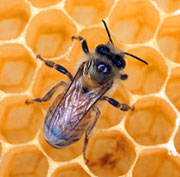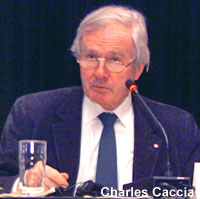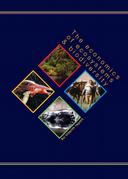
News |
- Canada's Parks Day!
- CEC Investigates US Mercury Pollution
- Canadian Lakes To Become Tailings Ponds
- Hydro Rate Increases Fail to Encourage Conservation
- Auditor General Petitioned on Devils Lake
- China Quake Threatens Giant Pandas
- Pesticides Suspended to Protect Bees
- Exemptions Weaken Ontario's Endangered Species Act
- Navigable Waters Protection Act Changes
- Canada Loses Environmental Leader
- US Senate Slams "Costly" Climate Bill
- Loss of Biodiversity to Cost Billions
| Canada's Parks Day! | 08 July 08 |
 Celebrate Canada's Parks Day July 19, 2008! Special events will be held in parks and historical sites in every province and territory. This national event started in 1990 and is held on the third Saturday of July each year. Last year nearly 50,000 people took part in more than 300 Parks Day events. Celebrate Canada's Parks Day July 19, 2008! Special events will be held in parks and historical sites in every province and territory. This national event started in 1990 and is held on the third Saturday of July each year. Last year nearly 50,000 people took part in more than 300 Parks Day events. Visitors will be invited to learn about the nature and history of Canada. Canada's Parks Day festivities include interpretative programs, art displays, canoe tours, wildflower walks, eco-challenge hikes, historical demonstrations and traditional Aboriginal activities. Events in Manitoba: Bird's Hill Provincial Park - Take in a behind the scenes interpretive tour of the park, enter your name to become a honourary Natural Resource Officer for a day (for kids age 8-12), participate in a scavenger hunt, and enjoy special shows at the amphitheatre. Camp Morton Provincial Park - Learn about the park's history on an interpretive walk. Duck Mountain Provincial Park - Enjoy games, face painting, interpretive programs, a BBQ and much more. Stephenfield Park - Free wiener roast, draws, kids activities and a chance to be a Natural Resource Officer for the day. Whiteshell Provincial Park - Participate in shelter building, day hikes, edible campfire programs, survival amphitheatre, or become a Natural Resource Officer for the day. Visit Canada's Parks Day website View Canada's Parks Day Manitoba Events for more parks Source: Canada Parks Council |
|
 Print version Print version |
Top |
| CEC Investigates US Mercury Pollution | 08 July 08 |
 On June 23, 2008 the Commission for Environmental Cooperation (CEC) unanimously decided to launch an investigation into whether coal-fired power plants are polluting water bodies across the United States. On June 23, 2008 the Commission for Environmental Cooperation (CEC) unanimously decided to launch an investigation into whether coal-fired power plants are polluting water bodies across the United States. The CEC is an international organization created by Canada, Mexico and United States under the North American Agreement on Environmental Cooperation (NAAEC), in conjunction with NAFTA. A 2005 submission by Waterkeeper Alliance, Sierra Legal Defense Fund, and supporting environmental groups asserted the US Environmental Protection Agency (EPA) was failing to effectively enforce the federal Clean Water Act by allowing mercury pollution from coal-fired power plants to be released into water bodies. A factual record will be developed to determine if US policies fail to control mercury emissions and account for deposition of air emissions into water. The Submitters claim emissions have lead to a rise in fish consumption advisories for mercury from 899 to 2347 since 1993. View June 23, 2008 CEC news article View June 23, 2008 CEC submission update View June 23, 2008 Council Resolution 08-03 (PDF) View Additional submission documentation Visit CEC - Citizen Submissions on Enforcement Matters website View June 27, 2008 Detroit News article Sources: CEC, Detroit News |
|
 Print version Print version |
Top |
| Canadian Lakes To Become Tailings Ponds | 08 July 08 |
 It is illegal in Canada to dispose of mine tailings in lakes but amendments made to federal regulations in 2006 opened the door for up to 16 lakes across Canada to be used as tailings ponds. It is illegal in Canada to dispose of mine tailings in lakes but amendments made to federal regulations in 2006 opened the door for up to 16 lakes across Canada to be used as tailings ponds.Mining companies avoid the cost of building contaminate ponds under a little-known subsection of the Metal Mining Effluent Regulation of the Fisheries Act - allowing fish-bearing natural water bodies to be reclassified as "tailings impoundment areas". Environmental groups are calling on Prime Minister Harper to reverse the decision while stressing the need for a national water strategy. Mining companies construct their own tailings impoundments to submerge the acid-producing waste in water to prevent oxidation. Watch June 18, 2008 CBC TV clip on YouTube View June 16, 2008 CBC article View June 23, 2008 Globe and Mail article View June 17, 2008 Grist article View June 17, 2008 Globe and Mail article View June 17, 2008 Global InfoMine article Sources: CBC, Globe and Mail, Grist, Global InfoMine, GuelphNow |
|
 Print version Print version |
Top |
| Hydro Rate Increases Fail to Encourage Conservation | 04 July 08 |
 The Manitoba Public Utilities Board (PUB) met late June 2008 to review Manitoba Hydro's proposal for an inverted rate structure, requests for rate increases, and concerns about overcharging for streetlights. The Manitoba Public Utilities Board (PUB) met late June 2008 to review Manitoba Hydro's proposal for an inverted rate structure, requests for rate increases, and concerns about overcharging for streetlights. Environmentalists and communities have demanded a system of inverted rates for years but feel Manitoba Hydro's option is not aggressive enough to result in significant reduction of energy consumption. Manitoba's electricity rates have been the lowest in North America while consumption increases by about 7 percent every year. PUB set electricity rates increases higher than Manitoba Hydro requested. A 5% increase as of July 1, 2008 is in place, and 5% increase will be implemented again on April 1, 2009. Streetlight rates are exempt from the increase. View June 2008 Portage Online article View June 16, 2008 CBC article View June 16, 2008 Winnipeg Free Press article View June 9, 2008 Winnipeg Free Press article View Public Utilities Board - Manitoba Hydro 2008 Board Orders View Public Utilities Board - Manitoba Hydro - Electricity Transcript of Proceedings Sources: Winnipeg Free Press, CBC |
|
 Print version Print version |
Top |
| Auditor General Petitioned on Devils Lake | 03 July 08 |
 Friends of the Earth Canada and the Manitoba Chambers of Commerce have joined together to petition the Auditor General of Canada to ensure Canadian politicians and officials protect Canadian waters against impacts associated with the Devils Lake Outlet. Friends of the Earth Canada and the Manitoba Chambers of Commerce have joined together to petition the Auditor General of Canada to ensure Canadian politicians and officials protect Canadian waters against impacts associated with the Devils Lake Outlet.The Petition submitted June 12, 2008 calls for public disclosure by Canada's Ministers of the Environment and Foreign Affairs on matters agreed to by Canada and the US in the August 2005 Multi-layered Safeguard Agreement. In addition, officials are set to reissue a permit to continue operating the Devils Lake outlet with only a rudimentary gravel filter in place - that will allow unaltered operation of the outlet until 2013. View June 12, 2008 Friends of the Earth press release View June 2008 petition submitted to the Auditor General, the federal Environment Minister and the Minister of Foreign Affairs by Friends of the Earth Canada and the Manitoba Chambers of Commerce (PDF) View June 16, 2008 KXnet.com North Dakota News Network article Source: Friends of the Earth Canada |
|
 Print version Print version |
Top |
| China Quake Threatens Giant Pandas | 03 July 08 |
 China's giant pandas are in danger after last month's devastating earthquake in the heart of mountainous panda country in Sichuan province. China's giant pandas are in danger after last month's devastating earthquake in the heart of mountainous panda country in Sichuan province. Much of China's remaining giant panda habitat was seriously damaged and at least 8 percent completely destroyed as the quake leveled vast stretches of dense forests and bamboo stands. Food shortages now pose a serious threat to surviving pandas. The Wolong Giant Panda Reserve Centre, the world's most important panda reserve, is just 20 miles away from the quake's epicenter. It is home to 86 giant pandas, which are slowly being transported to other wildlife reserves and temporary shelters due to the threat of landslides and aftershocks. Only 1,600 pandas still live in the wild and experts are concerned over reproductively of the endangered giant panda. The quake hit during a small 24-72 hour window when female pandas are fertile each spring. The Wolong research center was still able to artificially inseminate more than a dozen captive pandas. View June 24, 2008 CBC article View June 13, 2008 Planet Ark article View June 11, 2008 Seattle Times article View May 13, 2008 CNN article Sources: CBC, Planet Ark, Seattle Times, CNN |
|
 Print version Print version |
Top |
| Pesticides Suspended to Protect Bees | 25 June 08 |
 Germany is suspending the registration of eight insecticidal seed treatment products used on canola and corn after a wave of honeybee deaths. Beekeepers in Italy, France and Holland have noticed similar phenomena in their fields. Germany is suspending the registration of eight insecticidal seed treatment products used on canola and corn after a wave of honeybee deaths. Beekeepers in Italy, France and Holland have noticed similar phenomena in their fields.The German Federal Office of Consumer Protection and Food Safety (BVL) suspended all pesticides with the active ingredient being clothianidin. German beekeepers in the Rhine Valley state of Ger Baden-Wuerttemberg reported two-thirds of their bees died following corn seeding. Tests on dead bees showed that 99 percent had a build up of clothianidin. Clothianidin is a Bayer CropScience pesticide sold in Europe under the trade name Poncho. Used to kill corn rootworm, the pesticide attacks the nervous system of any insect and even at sub-lethal levels it can impair the bee's ability to find its way back to the hive. According to the US Environmental Protection Agency clothianidin is "highly toxic" to honeybees. Bayer's most important pesticide products (imidacloprid and clothianidin) are among those suspended by Germany, bringing in US $1.25 billion each year. The Coalition against BAYER-Dangers is demanding withdraws of all neonicotinoids from the market worldwide. View June 9, 2008 Institute of Science in Society press release View May 23, 2008 The Guardian article View May 17, 2008 Deutsche Welle article View May 21, 2008 Organic Consumers Association article View June 7, 2008 Food Democracy article Visit Coalition against BAYER Dangers website View May 20, 2008 Bayer CropScience press release Sources: Institute of Science in Society (ISIS), Guardian, Deutsche Welle, Organic Consumers Association, Food Democracy, Coalition against BAYER Dangers, Bayer CropScience |
|
 Print version Print version |
Top |
| Exemptions Weaken Ontario's Endangered Species Act | 24 June 08 |
 Ontario's new Endangered Species Act (ESA) was labeled the strongest of its kind in Canada by environmental groups who now fear the Act will be undermined by proposed exemptions. Ontario's new Endangered Species Act (ESA) was labeled the strongest of its kind in Canada by environmental groups who now fear the Act will be undermined by proposed exemptions.The Ontario government is proposing 23 exemptions to the Act, which is scheduled to take effect June 30, 2008. Environmental groups are outraged the forestry industry will be granted a one-year exemption to the ESA, allowing continued destruction of woodland caribou habitat. Endangered woodland caribou populations are declining by 11 percent each year. The forestry industry continues to lobby regarding the Endangered Species Act, which combines mandatory habitat protection and recovery planning for endangered species. Flexibility mechanisms have been incorporated to encourage stewardship and accommodate land uses that do not jeopardize the survival or recovery of endangered species. View June 18, 2008 The Green Journal article View Environmental Registry - Endangered Species Act, 2007 View June 10, 2008 The Green Pages article View May 20, 2008 The St. Catharine's Standard article View May 21, 2008 Toronto Star article Sources: The Green Pages, The Standard, The Green Journal, The Star, Ontario Government |
|
 Print version Print version |
Top |
| Navigable Waters Protection Act Changes | 24 June 08 |
 The Canadian government's Standing Committee on Transport, Infrastructure and Communities is proposing changes to the Navigable Waters Protection Act (NWPA). The changes are cause for concern for public interest groups and First Nation communities, as they would significantly reduce triggers for federal Environmental Assessment (EA) processes. The Canadian government's Standing Committee on Transport, Infrastructure and Communities is proposing changes to the Navigable Waters Protection Act (NWPA). The changes are cause for concern for public interest groups and First Nation communities, as they would significantly reduce triggers for federal Environmental Assessment (EA) processes. Currently, the NWPA is one of the primary triggers for federal Environmental Assessment of proposed projects in Canada. The amendments include changing the definition of "navigable waters" to exclude 'minor' waters from the Act. The government is considering deletion of specific reference to each of the four 'named' works under the Act (bridges, dams, causeways, and booms), which currently automatically trigger an EA. Gaile Whelan Enns, Director of Manitoba Wildlands commented that "Water is a federal responsibility when it comes to environmental assessment. What would it mean if the federal government were to have significantly diminished interest in, for instance, hydro dams or bridges for access by forestry companies? What does this mean for Manitoba hydro's system, which currently lacks permanent environment licenses?" It is unclear what public notification occurred with respect to input from the public, stakeholders and First Nation communities. The list of briefs and witnesses who presented before the Standing Committee includes a handful of NGOs, and no representatives from either Indian and Northern Affairs Canada or First Nations. View June 2008 Standing Committee on Transport Report, Infrastructure and Communities, Consideration of Proposed Amendments to the Navigable Waters Protection Act View June 6, 2008 Daily Observer article View June 10, 2008 Green Party of Canada press release View comments on proposed NWPA amendments at KNet (Keewaytinook Okimakanak, a Council of Northern Ontario Chiefs) Sources: Standing Committee on Transport, Infrastructure and Communities, Green Party of Canada, KNet, Daily Observer |
|
 Print version Print version |
Top |
| Canada Loses Environmental Leader | 24 June 08 |
 Charles Caccia, former Liberal MP and environmentalist passed away during May 2008 at the age of 78. Mr. Caccia represented the Toronto riding of Davenport between 1968 and 2004 and was appointed Minister of Environment under Prime Minister Pierre Trudeau. He also served as the environment critic in Opposition, and in 1993 became chair of the House of Commons Environment Committee. During his tenure the committee released government reports not yet public and critiqued government environment reports that were inadequate. Charles Caccia, former Liberal MP and environmentalist passed away during May 2008 at the age of 78. Mr. Caccia represented the Toronto riding of Davenport between 1968 and 2004 and was appointed Minister of Environment under Prime Minister Pierre Trudeau. He also served as the environment critic in Opposition, and in 1993 became chair of the House of Commons Environment Committee. During his tenure the committee released government reports not yet public and critiqued government environment reports that were inadequate."Mr. Caccia was a great Liberal who dedicated his life to building a better Canada," said Liberal Leader Stéphane Dion. As one of the most left-leaning Liberal Members of Parliament, Charles Caccia had a profound impact on the environmental movement in Canada and internationally. He was involved in the UN Climate Convention and Kyoto Protocol and was an advocate for the World Commission on Environment and Development. He also was Canada's representative on the World Commission on Forests and Sustainable Development, chairing the North American hearings, held in Winnipeg, Manitoba in 1996. Caccia remained active on environmental issues, serving as a senior fellow at the University of Ottawa Institute of the Environment. His legacy and status as a role model for parliamentarians and environmentalists continues. View May 5, 2008 Toronto Star article View May 12, 2008 Globe and Mail article View May 5, 2008 Globe and Mail article View May 4, 2008 Canoe article View May 5, 2008 Green Party press release View May 12th, 2008 The Hill Times article Source: The Star, Globe and Mail, Canoe, Green Party, The Hill Times |
|
 Print version Print version |
Top |
| US Senate Slams "Costly" Climate Bill | 19 June 08 |
 The United States Senate quickly shut down the proposed Lieberman-Warner Climate Security Act this month. The nation's top scientists, economists, business figures, environmental groups and national security communities supported the bill, calling on policymakers for urgent action on climate change. The United States Senate quickly shut down the proposed Lieberman-Warner Climate Security Act this month. The nation's top scientists, economists, business figures, environmental groups and national security communities supported the bill, calling on policymakers for urgent action on climate change. The bill proposed quick and substantial cuts to carbon emissions "on the order of 80 percent below 2000 levels by 2050". The opposition, no longer denying the science of global warming, argued that placing a cap on carbon emissions would wreck the economy. Environmental groups remain optimistic and see this as an opportunity to achieve better legislation than the Lieberman-Warner Bill. A new "Investing in Climate Action and Protection Act," dubbed the iCap Bill was recently introduced in the House by democratic Massachusetts Representative Ed Markey. The bill calls for a moratorium on traditional coal plants and aggressive emission cuts. View May 29, 2008 Union of Concerned Scientists press release View Scientists and Economists' Call to Action View June 9, 2008 Time article View June 10, 2008 Corporate Social Responsibility News article View May 30, 2008 1Sky article View June 2, 2008 Reuters article View June 6, 2008 Reuters article Sources: Union of Concerned Scientists, Time, Corporate Social Responsibility Newswire, 1Sky, Reuters |
|
 Print version Print version |
Top |
| Loss of Biodiversity to Cost Billions | 19 June 08 |
 Environment ministers of G8 countries and newly industrializing countries have endorsed a German lead study about the economic significance of global loss of biological diversity. Environment ministers of G8 countries and newly industrializing countries have endorsed a German lead study about the economic significance of global loss of biological diversity. Lead author Mr. Pavan Sukhdev of The Economics of Ecosystems and Biodiversity (TEEB), an interim report, identifies how human well-being is utterly dependent on "ecosystem services" from forests, rivers and marine environments. The report says the world has lost 40 percent of its forests in 300 years, half its wetlands in just 50 years, and will loose 60 percent of coral reefs by 2030. "We are consuming the world's biodiverse ecosystem at an unsustainable rate and this is starting to have serious socio-economic impacts", say the authors. "There are no economies without environments but there are environments without economies." The second phase of the study headed by Germany's Ministry for the Environment and the European Commission, will provide a toolkit and valuation model for policy makers. View May 2008 Europa Interim report, The Economics of Ecosystems and Biodiversity (PDF) View May 29, 2008 IDW press release Visit European Commission - Nature & Biodiversity website View March 2008 International Workshop Proceedings, Economics of Global Loss of Biological Diversity View May 30, 2008 The Guardian article Sources: European Union, IDW, Ecologic, The Guardian |
|
 Print version Print version |
Top |


 RSS Feeds:
RSS Feeds: